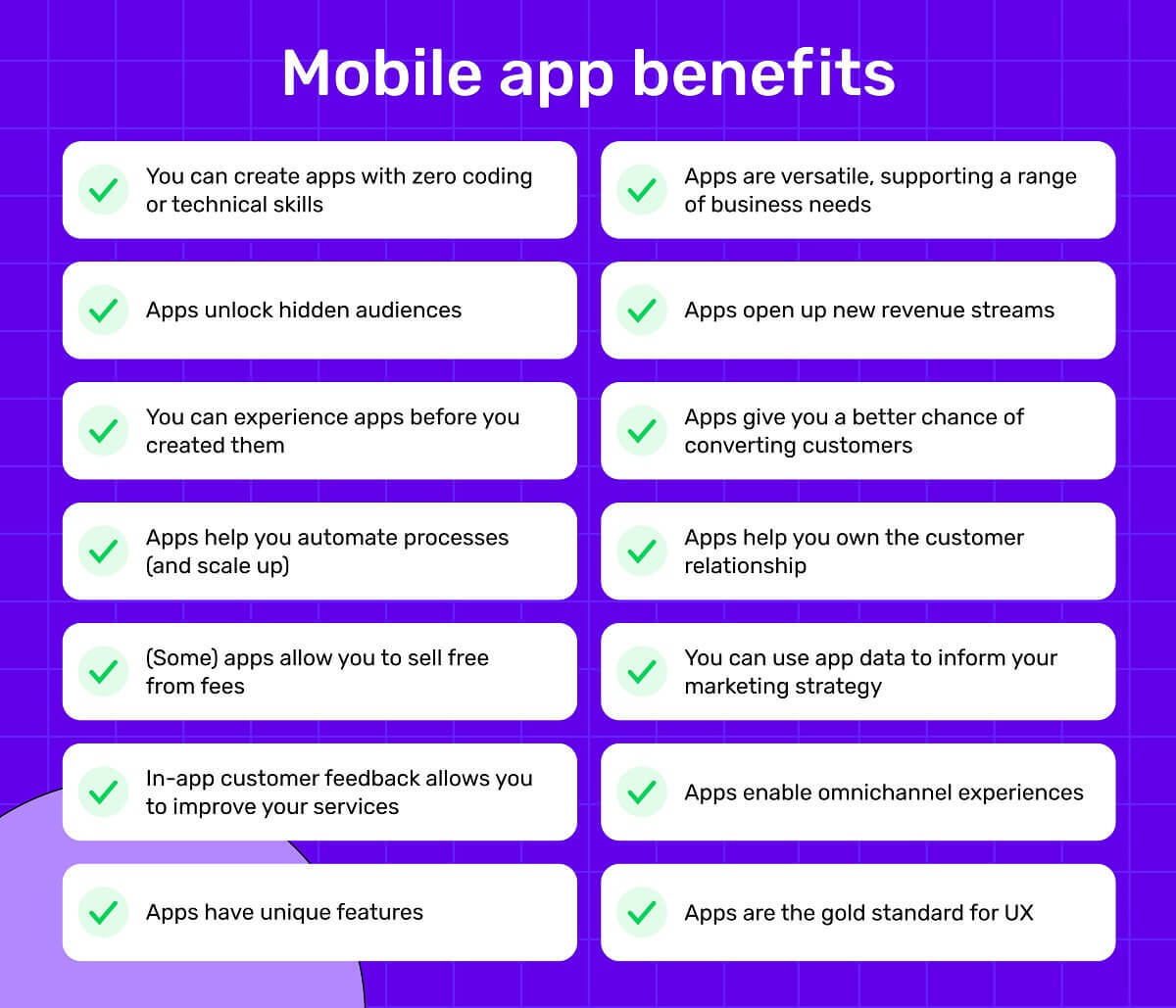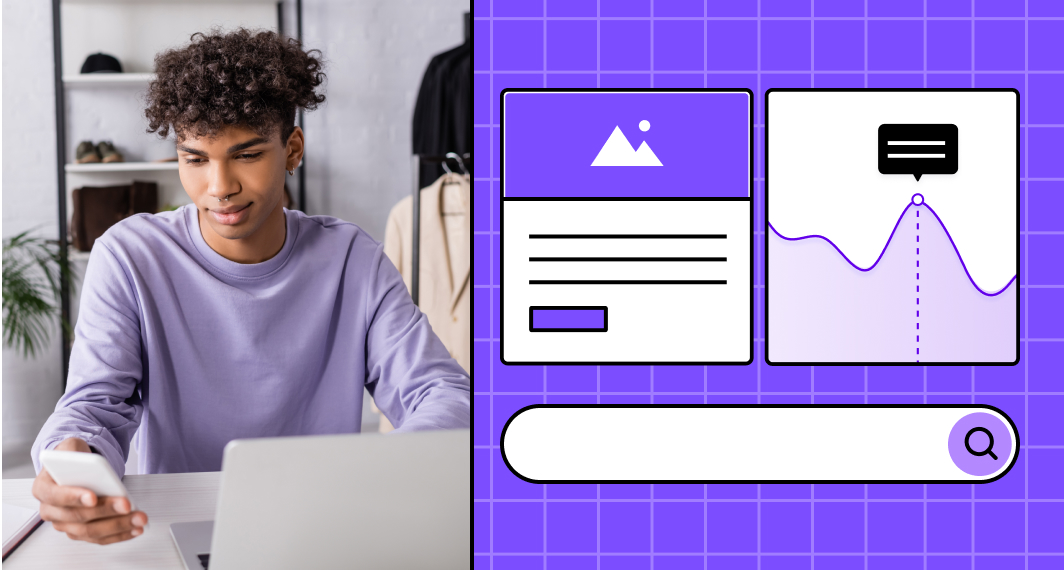What is app development?
Application development is the process of creating software applications for various platforms, such as desktop computers, mobile devices and web browsers. It aims to create solutions that enable digital transformation and improve business efficiency while enhancing user experience.
App development involves designing, coding, testing and deploying apps that fulfil your specific requirements and provide the desired functionality. Developing high-quality applications requires technical skills, creativity and attention to detail.

What are the main benefits of app development?
App development has a range of benefits, including:
- It helps your business access new revenue streams; for example, you could pursue a freemium model or monetise your app data
- It enables you to support different business needs, including everything from daily project tracking to enterprise-wide order management
- It enables you to automate processes and scale up, including returns, order management and inventory management
- It allows you to own the customer relationship, by comparison to marketplaces, which build loyalty to their store rather than your brand
- It gives you a better chance of converting customers by leveraging push notifications
- It allows you to deliver optimal user experiences, keeping your customers coming back for more
- It helps your business establish a strong brand presence, increasing visibility and engaging with your target audience more effectively.
- You don’t need technical skills or a huge budget to develop apps; this is because of no-code app builders and competitively priced app platforms
- You can use prototyping software before you commit to the app development process, meaning you don’t waste time and money on an app that isn’t fit for purpose
- You can unlock hidden audiences by developing apps; after all, billions of people access millions of apps via mobile app stores
- You can optimise your products and servicesusing in-app user feedback
- You can sell free from feeswhen you use certain platforms to develop your app, meaning all the online revenue you make is yours to keep
- You can use app data to inform your marketing strategy by reviewing your audience’s behavioural analytics
- You can leverage unique featuresby developing an app, including cameras, contact lists and location-based services and deliver seamless, personalised experiences to users
- You can deliver omnichannel experiences by developing an app, supporting your website and bricks-and-mortar store
- You can unlock the power ofpush notifications, keeping app users informed about discounts and promotions
But there are also a ton of bonus benefits, such as:
For a deep dive into everything above, check out our blog on app benefits 👈
Limitations of app development
Alongside potential benefits, app development does have some limitations:
1- High cost
The cost of mobile app development is typically expensive, requiring you to invest in skilled developers, design resources, testing and ongoing maintenance.
2- Time-consuming process
The app development process, including planning, design, development, testing and deployment can take significant time to complete.
3- Platform fragmentation
Developing for multiple mobile platforms (such as iOS and Android) can require extra effort, as each platform has its own native development requirements, frameworks and design guidelines.
4- Market saturation
Mobile app stores are drowned with millions of applications, making it challenging for new apps to gain visibility and compete for user attention.
5- User acquisition and retention
Acquiring a substantial customer base can be difficult, and retaining users in a highly competitive market requires continuous effort in marketing, user engagement and delivering a compelling user experience.
6- Maintenance and updates
Apps require ongoing maintenance, bug fixes, security updates and compatibility enhancements to adapt to changing operating systems, devices and user expectations. This comes at an additional cost.
7- Limited resources and skills
Developing a mobile application may require specific technical skills, such as programming languages and frameworks, which may not be readily available or require additional training.
8- Compatibility challenges
Ensuring compatibility across different devices, screen sizes, and operating system versions can be complex and may require additional testing and optimisation.
9- User feedback and support
Handling user feedback, bug reports, and providing support can be time-consuming, especially for apps with a large user base.
10- Monetization challenges
Generating revenue from apps can be challenging, as users have high expectations for free or low-cost apps, and competition in monetization models such as advertisements or in-app purchases is fierce.
Types of app development
There are many types of app development and you can adopt any of the processes mentioned below as per your specific needs and availability of resources.
1- Waterfall
The waterfall model follows a linear sequential approach, where each stage (requirements, design, development, testing, deployment) is completed before moving to the next. It’s well-suited for projects with stable requirements and clear scope.
2- Agile
Agile methodologies, such as Kanban and Scrum, emphasise iterative and incremental development. The project is divided into sprints, and features are developed and tested in short cycles, allowing for flexibility, continuous feedback and adaptability.
3- Rapid application development (RAD)
RAD focuses on rapid prototyping and iterative development. It involves user involvement, quick feedback loops, and the use of visual development tools to accelerate the development process.
4- DevOps
DevOps combines software development (Dev) and IT operations (Ops) to enable faster and more reliable software delivery. It emphasises collaboration, automation and continuous integration and deployment (CI/CD) to achieve faster time-to-market and improved software quality.
5- Lean development
Lean development aims to eliminate waste and focus on value delivery. It emphasises maximising customer value, reducing unnecessary activities and continuously improving the development process.
6- Hybrid development
Hybrid development involves using a combination of native and web technologies to build cross-platform apps. It allows for code reuse and faster development across multiple platforms.
7- Low-code/No-code development
Low-code/no-code app development platforms enable app development with minimal coding or programming knowledge. These platforms provide visual development interfaces and pre-built components, allowing for faster development and easier customisation.
8- Continuous integration and continuous delivery (CI/CD)
CI/CD is an approach that focuses on automating the build, integration, testing and deployment processes. It aims to deliver software updates frequently, ensuring stability, quality and faster time to market.
Best practices to follow for app development
When it comes to app development, there are several best practices you should follow in order to ensure a successful and high-quality outcome. Below are some key best practices:
1- Clear requirements
Start with a thorough understanding of your app's requirements and objectives. Document them clearly and involve your stakeholders in the process to ensure alignment and avoid misunderstandings.
2- User-centric design
Design the app with the end user in mind. Conduct user research, create user personas and design friendly user interfaces that prioritise usability and a seamless user experience.
3- Responsive design
Create a responsive design that adapts to different screen sizes and orientations, ensuring a consistent and optimal experience across various devices.
4- Modular architecture
Adopt a modular and scalable architecture separating different components and functionalities, allowing for easier maintenance, updates and enhancements.
5- Secure development practices
Implement security best practices throughout the development process, including secure coding practices, encryption, user authentication and protection against common vulnerabilities.
6- Performance optimisation
Optimise the app's performance by minimising load times, optimising code, reducing unnecessary network requests and implementing caching strategies.
7- Testing and quality assurance
Implement a robust testing strategy, including unit testing, integration testing and user acceptance testing, to identify and fix bugs, ensure functionality and maintain overall quality.
8- Regular updates and maintenance
Plan regular updates and maintenance to address bugs, security vulnerabilities and compatibility issues, as well as to introduce new features and improvements based on your customer's feedback.
9- User feedback and iteration
Encourage and incorporate user feedback throughout the development process. Collect user insights, analyse app usage data and iterate on the app's features and functionalities to continually improve the user experience.
Future of app development
The future of app development is expected to be characterised by emerging technologies such as artificial intelligence, augmented reality and the Internet of Things (IoT).
There will be a growing emphasis on creating intelligent, personalised and immersive app experiences. Cross-platform development frameworks will continue evolving, enabling developers to create apps seamlessly working across multiple devices.
Moreover, app development will increasingly focus on security, privacy and data protection, as well as on enhancing app performance and optimising user engagement through data-driven insights and machine learning algorithms.
Fancy building your app without the heavy lifting? Develop your mobile app with Builder.ai. Builder.ai is a fast and cost-effective solution for developing native applications.
- Just tell us your app idea and we will develop it for you
- Get upfront costs and timeline; 100% transparency
- Keep your software up to date with aftercare
Get a free app prototype now!
Bring your software to life in under 10 mins. Zero commitments.


 Facebook
Facebook X
X LinkedIn
LinkedIn YouTube
YouTube Instagram
Instagram RSS
RSS


